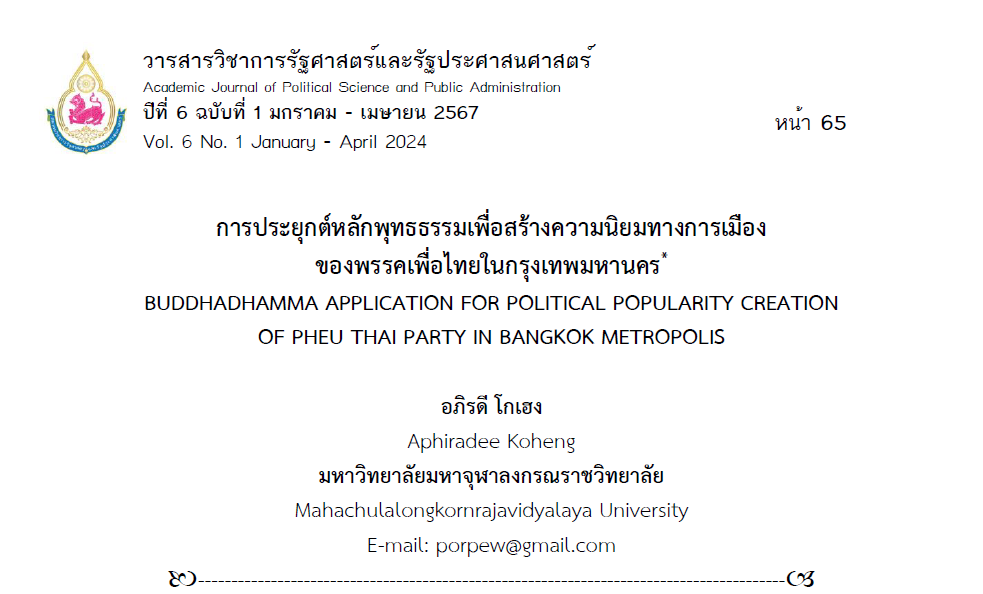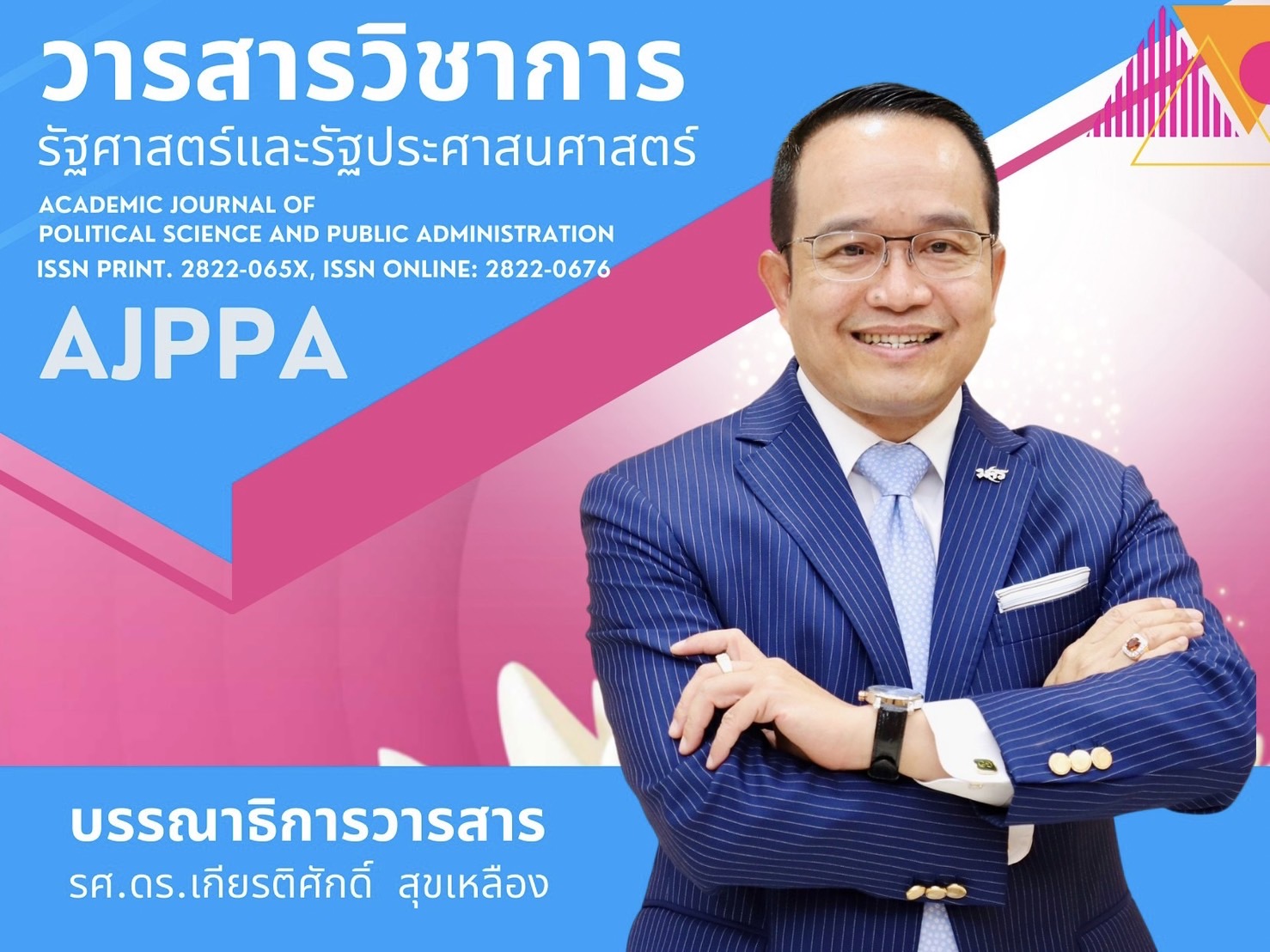การประยุกต์หลักพุทธธรรมเพื่อสร้างความนิยมทางการเมือง ของพรรคเพื่อไทยในกรุงเทพมหานคร
คำสำคัญ:
การประยุกต์, หลักพุทธธรรม, ความนิยมทางการเมือง, พรรคเพื่อไทยบทคัดย่อ
บทความวิจัยนี้มีวัตถุประสงค์ 1. เพื่อศึกษาสภาพทั่วไปของความนิยมทางการเมือง 2. เพื่อศึกษาปัจจัยที่ส่งผลต่อความนิยมทางการเมือง และ 3. เพื่อศึกษาการประยุกต์หลักพุทธธรรมในการสร้างความนิยมทางการเมืองของพรรคเพื่อไทยในกรุงเทพมหานคร เป็นการวิจัยแบบผสานวิธีประกอบไปด้วย การวิจัยเชิงคุณภาพ โดยการสัมภาษณ์เชิงลึกกับผู้ให้ข้อมูลสำคัญ จำนวน 18 รูปหรือคน และการสนทนากลุ่มเฉพาะ จำนวน 8 รูปหรือคน และการวิจัยเชิงปริมาณจากกลุ่มตัวอย่าง จำนวน 400 คน โดยใช้แบบสอบถาม สถิติที่ใช้ในการวิเคราะห์ข้อมูลได้แก่ ความถี่ ร้อยละ ค่าเฉลี่ย ส่วนเบี่ยงเบนมาตรฐาน และใช้วิธีการวิเคราะห์การถดถอยพหุคูณแบบมีขั้นตอน
ผลการศึกษาพบว่า 1. สภาพทั่วไปของความนิยมทางการเมือง โดยภาพรวมอยู่ในระดับมาก มีค่าเฉลี่ยเท่ากับ 3.99 2. ปัจจัยที่ส่งผลต่อความนิยมทางการเมืองของพรรคเพื่อไทยในกรุงเทพมหานคร พบว่า การสื่อสารและสังคหวัตถุ 4 ส่งผลต่อความนิยมทางการเมืองของพรรคเพื่อไทยในกรุงเทพมหานคร อย่างมีนัยสำคัญทางสถิติที่ระดับ 0.01 3. การประยุกต์หลักพุทธธรรมในการสร้างความนิยมทางการเมืองของพรรคเพื่อไทยในกรุงเทพมหานคร พบว่า ใช้หลักสังควัตถุ 4 ในการสร้างความนิยมทางการเมืองของพรรคเพื่อไทยในกรุงเทพมหานคร คือ ทาน ปิยวาจา อัตถจริยา และสมานัตตตา
เอกสารอ้างอิง
ไชยา พรหมา. (2563). พรรคการเมืองกับการสร้างความนิยมทางการเมือง : กรณีศึกษาพรรคเพื่อไทย. วารสารรามคำแหง. ฉบับรัฐประศาสนศาสตร์, 3(2), 56-77.
ณัฐพร ยงวงศ์ไพบูลย์ และคณะ. (2565). ความนิยมทางการเมืองของพรรคพลังประชารัฐในกรุงเทพมหานคร. วารสารการบริหารและสังคมศาสตร์ปริทรรศน์, 5(4), 121-134.
ธรรมรัตน์ ธรรมยาฤทธิ์. (2561). ความนิยมทางการเมืองของประชาชนหมู่บ้านเสื้อแดงจังหวัดอุดรธานีที่มีต่อพรรคเพื่อไทยภายหลังการรัฐประหาร 2557. วารสารการเมืองการปกครอง, 8(3), 29-48.
ประคอง มาโต. (2564). การส่งเสริมความนิยมทางการเมืองของประชาชนที่มีต่อนักการเมืองในจังหวัดอุทัยธานี (ดุษฎีนิพนธ์ปรัชญาดุษฎีบัณฑิต สาขาวิชารัฐศาสตร์). พระนครศรีอยุธยา: มหาวิทยาลัยมหาจุฬาลงกรณราชวิทยาลัย.
พระชินกร สุจิตฺโต (ทองดี). (2564). การบูรณาการหลักพุทธธรรมเพื่อส่งเสริมการสื่อสารทางการเมือง สำหรับประชาชนจังหวัดพระนครศรีอยุธยา (ดุษฎีนิพนธ์ปรัชญาดุษฎีบัณฑิต สาขาวิชารัฐศาสตร์). พระนครศรีอยุธยา: มหาวิทยาลัยมหาจุฬาลงกรณราชวิทยาลัย.
พระนุชิต นาคเสโน (โพวิชัย) และคณะ. (2565). การพัฒนาการสื่อสารทางการเมืองตามแนวพระพุทธศาสนาของนักการเมืองท้องถิ่นในจังหวัดพระนครศรีอยุธยา. วารสารพุทธนวัตกรรมและการจัดการ, 6(2), 59-69.
พระโสภณ โสภโณ (ทองสม) และคณะ. (2563). การประยุกต์ใช้หลักสังคหวัตถุ 4 เพื่อเสริมสร้างความเข้มแข็ง ของชุมชนวัดใหม่ทุ่งคาอำเภอรัตภูมิ จังหวัดสงขลา. วารสารมหาจุฬานาครทรรศน์, 7(3), 15-25.
มนตรี วิชัยวงษ์ และคณะ. (2562). การเสริมสร้างสุขภาวะด้วยหลักธรรมสังคหวัตถุ 4 ของชุมชนการเคหะหนองหอย จังหวัดเชียงใหม่. วารสารสถาบันวิจัยญาณสังวร, 10(1), 169-179.
วัลลภ รัฐฉัตรานนท์ และนพพล อัคฮาด. (2557). ความนิยมของคนอีสานที่มีต่อพรรคเพื่อไทย: ศึกษากรณี จังหวัดขอนแก่น. วารสารรัฐศาสตร์ปริทรรศน์ มหาวิทยาลัยเกษตรศาสตร์, 1(1), 75-100.
ศิริรัตน์ พิสัยเลิศ. (2564). การสร้างและรักษาฐานเสียงของพรรคเพื่อไทยในจังหวัดเชียงรายระหว่าง พ.ศ. 2544-2562. วารสารรัฐศาสตร์และรัฐประศาสนศาสตร์, 12(2), 97-122.
ศุภกิจ ภักดีแสน และคณะ. (2563). หลักพุทธธรรมเพื่อการให้บริการประชาชน. วารสาร มจร อุบลปริทรรศน์, 5(3), 619-930.
Yamane, T. (1973). Statistic: An Introductory Analysis (3rd ed). New York: Harper and Row.

ดาวน์โหลด
เผยแพร่แล้ว
รูปแบบการอ้างอิง
ฉบับ
ประเภทบทความ
หมวดหมู่
สัญญาอนุญาต
ลิขสิทธิ์ (c) 2024 วารสารวิชาการรัฐศาสตร์และรัฐประศาสนศาสตร์

อนุญาตภายใต้เงื่อนไข Creative Commons Attribution-NonCommercial-NoDerivatives 4.0 International License.




